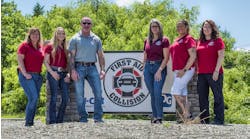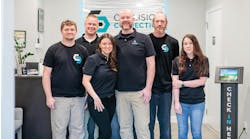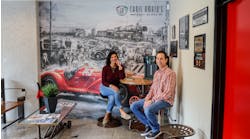One body shop that recognizes the importance of salesmanship is Clarkstown International Collision of Nanuet, N.Y. Gene Cortes, who owns the business and is one of four appraisers there, explains his philosophy. "When you come for an estimate, not only do I hand you a piece of paper. We'll sit you down and explain the process. At the end, we usually hand them a copy of the estimate and give them a tour of the shop and give them an idea of the kind of equipment they need to look for."
Noting that many wealthy people live in the Nanuet area, Cortes says, "If a car is worth $30,000 or $40,000, you don't want to leave it to any body shop. We tell them, 'If you're looking for quality, this is the place.'"Among the pieces of equipment that Cortes and other Clarkstown appraisers highlight are a unibody bench, an electronic measuring system, a computerized paint mixing system and a downdraft spray booth. Also on the tour is the detailing area, where the company has two employees dedicated to cleaning up each car when the body work has been completed. "We tell people they can come with a suit and tie on to pick up their car," comments Cortes. All vehicles are inspected by the detailer and by the appraiser before the customer is called and advised that his or her car is ready. As part of the final inspection process, the radio is tested and the air-conditioning is turned on. "Any dust blows on your face, not the customer's," he notes.
Cortes expects other appraisers to use the same approach he does. "When I hire appraisers, I tell them, 'I don't hire you to write estimates. I hire you to write jobs. You need to talk to the customer about why this is the place to go.'"Excellent salesmanship undoubtedly has contributed to Clarkstown International Collision's steady growth. Cortes says the company has never had a slump since it first opened in a 5000-sq.-ft. building in West Nyack, N.Y. in 1992.
"I started the business with only three employees—a body man, myself and my wife," notes Cortes. "It took two years to get the business off the ground. It was very tough. But then we kept growing."
Cortes, who borrowed money from family to get started, remembers opening a bank account for the shop with just $100. "I was afraid to tell them how much I had," he recalls. Within two and a half years, however, he had repaid all of his loans.
As Clarkstown grew, Cortes bought additional property next door and expanded. By 2003, the company was ready to expand again and moved into its current 14,000-sq.-ft. facility. To fund the expansion, Cortes borrowed $1.5 million, which, once again, he has had no trouble paying back. An added benefit is that he won the Small Businessperson of the Year Award for 2007 from the U.S. Small Business Administration, which guaranteed the loan and helped Cortes apply for it.
"When you borrow that kind of money, people want to see a financial statement every year," notes Cortes. "They saw the way the business was growing and nominated me."
Clarkstown International Collision is the second body shop that Cortes has owned. After emigrating from Cuba as a child and attending college at the City University of New York, he started his first body shop in 1973, but sold it in 1979 and went to work for several years for an insurance company as an adjuster.
Working as an insurance adjuster taught him many valuable lessons, which he applied to his new business. For example, Cortes says, "When you see an owner doing body work, you know this is not a business that is moving forward. When customers come in, they don't want to deal with a guy full of dust with dirty hands."
Another lesson was the importance of an attractive office. When people walk into Clarkstown International Collision, Cortes says, "The first thing they say is, 'This looks like a doctor's office, not a body shop.' The staff in the office is very well dressed and well presented."
With one exception, all employees at Clarkstown International Collision—including the office staff—wear a uniform. The only people who don't are employees who have been with the shop less than three months and are going through a probationary period. "When you get a uniform, you're working here," Cortes says.
Cortes' company has a very low turnover rate among its employees. "When I hire people, I tell them, 'If you start working here, you're going to be joining the family. Everyone has to respect each other.' " To help retain employees, the company offers a major medical and 401K plan.
When the company has an open position, Cortes asks existing employees if they know of someone who would be a good fit. "When their friends come, they know what to expect and what not to expect," he says.
Cortes has both a shop manager and a general manager on staff. Prior to the move to Nanuet, he served as general manager, but since then has handed the job over to Cristina Mellozzo, an employee who was promoted from within.
The move to the larger facility also helped eliminate some of the bottlenecks on the shop floor. "We designed it with an assembly line in mind," Cortes says. "When you put the car in the shop, it goes from the frame machine to the body shop to prep to paint and then from assembly to detailing. The car is always in drive, never in reverse. It's always going forward." As a result, the company's average cycle time was reduced from more than seven days to less than four.
The shop performs mechanical repairs on vehicles in the shop because of collision damage. Cortes also owns an auto glass company, Sagma Auto Glass Inc., which eliminates the need to sublet glass repairs. (The name of the glass business was devised from the first initials of Cortes, his wife Anna, and their three daughters—Melly, Annette and Stephanie.) "We do everything in house. It's a one-stop deal," he says.
Several direct repair programs contribute about 35 percent of the shop's business. The rest comes from word of mouth and drive-in business.
To generate more drive-in work, Cortes advertises on cable TV and in the yellow pages. Not surprisingly, there is an emphasis on salesmanship in the company's advertising message. "I train the consumer so they know what they're shopping for," Cortes says.




